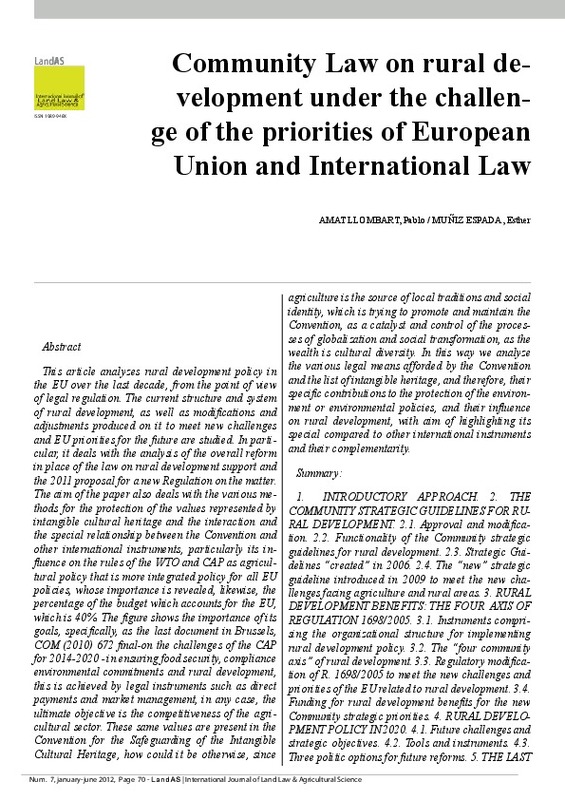JavaScript is disabled for your browser. Some features of this site may not work without it.
Buscar en RiuNet
Listar
Mi cuenta
Estadísticas
Ayuda RiuNet
Admin. UPV
Community Law on rural development under the challenge of the priorities of European Union and International Law
Mostrar el registro sencillo del ítem
Ficheros en el ítem
| dc.contributor.author | Amat Llombart, Pablo
|
es_ES |
| dc.contributor.author | Muñiz-Espada, Esther
|
es_ES |
| dc.date.accessioned | 2018-10-13T04:29:15Z | |
| dc.date.available | 2018-10-13T04:29:15Z | |
| dc.date.issued | 2012 | es_ES |
| dc.identifier.uri | http://hdl.handle.net/10251/110304 | |
| dc.description.abstract | [EN] This article analyzes rural development policy in the EU over the last decade, from the point of view of legal regulation. The current structure and system of rural development, as well as modifications and adjustments produced on it to meet new challenges and EU priorities for the future are studied. In particular, it deals with the analysis of the overall reform in place of the law on rural development support and the 2011 proposal for a new Regulation on the matter. The aim of the paper also deals with the various methods for the protection of the values represented by intangible cultural heritage and the interaction and the special relationship between the Convention and other international instruments, particularly its influence on the rules of the WTO and CAP as agricultural policy that is more integrated policy for all EU policies, whose importance is revealed, likewise, the percentage of the budget which accounts for the EU, which is 40%. The figure shows the importance of its goals, specifically, as the last document in Brussels, COM (2010) 672 final-on the challenges of the CAP for 2014-2020 - in ensuring food security, compliance environmental commitments and rural development, this is achieved by legal instruments such as direct payments and market management, in any case, the ultimate objective is the competitiveness of the agricultural sector. These same values are present in the Convention for the Safeguarding of the Intangible Cultural Heritage, how could it be otherwise, since agriculture is the source of local traditions and social identity, which is trying to promote and maintain the Convention, as a catalyst and control of the processes of globalization and social transformation, as the wealth is cultural diversity. In this way we analyze the various legal means afforded by the Convention and the list of intangible heritage, and therefore, their specific contributions to the protection of the environment or environmental policies, and their influence on rural development, with aim of highlighting its special compared to other international instruments and their complementarity | es_ES |
| dc.language | Inglés | es_ES |
| dc.publisher | GIPUR | es_ES |
| dc.relation.ispartof | Internacional Journal of Land Law and Agricultural Science | es_ES |
| dc.rights | Reserva de todos los derechos | es_ES |
| dc.subject.classification | DERECHO CIVIL | es_ES |
| dc.title | Community Law on rural development under the challenge of the priorities of European Union and International Law | es_ES |
| dc.type | Artículo | es_ES |
| dc.rights.accessRights | Abierto | es_ES |
| dc.contributor.affiliation | Universitat Politècnica de València. Departamento de Urbanismo - Departament d'Urbanisme | es_ES |
| dc.description.bibliographicCitation | Amat Llombart, P.; Muñiz-Espada, E. (2012). Community Law on rural development under the challenge of the priorities of European Union and International Law. Internacional Journal of Land Law and Agricultural Science. (7):70-95. http://hdl.handle.net/10251/110304 | es_ES |
| dc.description.accrualMethod | S | es_ES |
| dc.relation.publisherversion | http://www.gipur.org/journals/index.php/LandAS | es_ES |
| dc.description.upvformatpinicio | 70 | es_ES |
| dc.description.upvformatpfin | 95 | es_ES |
| dc.type.version | info:eu-repo/semantics/publishedVersion | es_ES |
| dc.description.issue | 7 | es_ES |
| dc.identifier.eissn | 1989-984X | es_ES |
| dc.relation.pasarela | S\244365 | es_ES |






